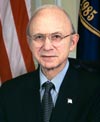- President's Cabinet
- Executive Office of the President
- USA Freedom Corps
- Faith-Based & Community
- Office of Management and Budget
- National Security Council
- Citizens' Handbook
- Federal Agencies & Commissions
- Federal Statistics
- Afghanistan
- Africa
- Budget Management
- Defense
- Economy
- Education
- Energy
- Environment
- Global Diplomacy
- Health Care
- Homeland Security
- Immigration
- International Trade
- Iraq
- Judicial Nominations
- Middle East
- National Security
- Veterans
|
Home >
Government
|
Allen Weinstein
Archivist of the United States
 In February 2005, historian Allen Weinstein was confirmed by the U.S. Senate and began his service as the 9th Archivist of the United States leading the National Archives and Records Administration (NARA).
In February 2005, historian Allen Weinstein was confirmed by the U.S. Senate and began his service as the 9th Archivist of the United States leading the National Archives and Records Administration (NARA).
From 1985 to 2003, he served as President of The Center for Democracy, a non-profit foundation that he created in 1985 to promote and strengthen the democratic process, based in Washington, DC. His international awards include the United Nations Peace Medal (1986) for "efforts to promote peace, dialogue and free elections in several critical parts of the world"; The Council of Europe's Silver Medal (twice, in 1990 and 1996), presented by its Parliamentary Assembly, for "outstanding assistance and guidance over many years"; and awards from the presidents of Nicaragua and Romania for assistance in their countries' democratization processes. His other awards and fellowships have included two Senior Fulbright Lectureships, an American Council of Learned Societies Fellowship, the Commonwealth Fund Lectureship at the University of London, and a Woodrow Wilson International Center for Scholars Fellowship. In 1987 he delivered the Bicentennial Fourth of July Oration at Boston's Faneuil Hall. He became Senior Advisor on Democratic Institutions at IFES (International Foundation for Election Systems) in September 2003.
He was University Professor and Professor of History at Boston University from 1985-89, University Professor at Georgetown University from 1981-1984 and, from 1981 to 1983, Executive Editor of The Washington Quarterly at Georgetown's Center for Strategic and International Studies. He served as a member of The Washington Post editorial staff in 1981. From 1966-81 he was Professor of History at Smith College and Chairman of its American Studies Program. In 1984 he served as President of the Center for the Study of Democratic Institutions. From 1982-84 he directed the research study that led to creation of the National Endowment for Democracy and was Acting President of the Endowment. He has also held visiting professorships at Brown, Columbia, FIU, and GWU.
Weinstein was a founding member in 1985 of the Board of Directors of the United States Institute of Peace and Chairman of its Education and Training Committee, remaining a Director until 2001, and now serves on the Chairman's Advisory Council. He was a founding officer of the International Institute of Democracy in Strasbourg from 1989 to 2001. He chaired the Judging Panel for the annual International IMPAC Dublin Literary Award from 1995-2003. He serves on the Advisory Council of the LBJ School of Public Affairs (University of Texas-Austin). He is Chairman of the Woodrow Wilson Presidential Library Advisory Council. He chaired the annual "Global Panel" in the Netherlands from 1993-98. From 1982-91 he was a member of the Foreign Policy Association's Editorial Advisory Board.
Weinstein's books include The Story of America (DK Publishers, 2002), The Haunted Wood: Soviet Espionage in America--The Stalin Era (Random House, 1999; Modern Library paperback, 2000); Perjury: The Hiss-Chambers Case (Knopf; Vintage paperback; Hutchinsons Ltd.; revised ed., Random House paperback, 1997), which received several citations including an American Book Award nomination; Freedom and Crisis: An American History (Random House, 3 eds.); Between the Wars: American Foreign Policy from Versailles to Pearl Harbor (Berkley paperback); Prelude to Populism (Yale University Press); and among edited collections, Conflict in America (Voice of America); American Negro Slavery (4th ed., Oxford University Press); American Themes: Essays in Historiography (Oxford); and Truman and the American Commitment to Israel (Hebrew University/Magnes Press).
Weinstein's articles and essays have appeared in The American Scholar, The American Historical Review, The Business History Review, Commentary, Encounter, Esquire, The Journal of American History, The Journal of American Studies, The New Republic, New York, The New York Review of Books, The New York Times, Newsweek, Time, U.S. News and World Report, The Wall Street Journal, and The Washington Post. His television credits include that of historical consultant on two History Channel programs on Soviet espionage (1998-1999), the 1988-89 PBS series Face-to-Face: Conversations on the U.S.-Soviet Summitry (Co-Host, Editor and Writer), The Salvadoran Debate (Moderator and Producer, 1984), and Inside Washington (Host and Creator), a 1981 PBS public affairs series. He has been a frequent commentator on CNN, C-SPAN, and other networks.
His international public service activities include chairing the Center's election observation delegations in El Salvador (1991), Nicaragua (1989-90, 1996), Panama (1988-89), the Philippines (1985-6), and Russia (1991, 1996, 2000). Weinstein organized a bipartisan group, at the request of the U.S. Senate Foreign Relations Committee, which reported on the preparations for the Philippines' presidential election; later he was a member of the U.S. Observer Delegation, advisor to the Delegation's co-chairmen, and co-author of its final report. In 1983 Weinstein served as Vice-Chairman of the U.S. delegation to a UNESCO conference in Tashkent. He was also Coordinator and Vice-Chairman of the U.S. delegation to the 1982 UNESCO World Conference on Culture.



